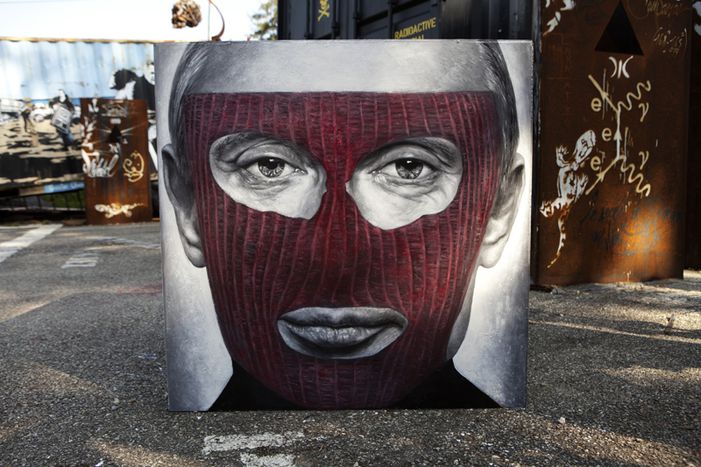
Bolotnaya Eight: Putin is scared of Moscow Maidan
Published on
On Monday Ukrainian President Viktor Yanukovych was deposed. An interim government pieced itself together and a new Ukraine began to emerge from the ashes of the Maidan. But as triumphant Ukrainians danced victory jigs in Kiev, rising up from the smouldering barricades like unwieldy phoenixes in their home made armour, 700km away in Moscow, protestors were being bundled into police vans.
As Yanukovych fled in fear, Vladimir Putin put his foot down. On Monday the ‘Bolotnaya Eight’ were sentenced to a combined total of 20 years in prison for participating in an anti-government protest on 6 May 2012, the eve of Putin’s third inauguration. The charges of violence are dubious and were never proved beyond the inconsistent testimonies of a handful of riot police. One protestor, Yaroslav Belousov, 22, was sentenced to 2 and a half years for throwing a lemon, which police reported as an ‘unidentified hard yellow object’ which caused an officer ‘excrutiating pain’.
But why is the Bolotnaya case so important, when so many other Russians have already been imprisoned on trumped-up charges? The case has a powerful symbolism, since Bolotnaya Square is where the protest movement first took off in December 2011.
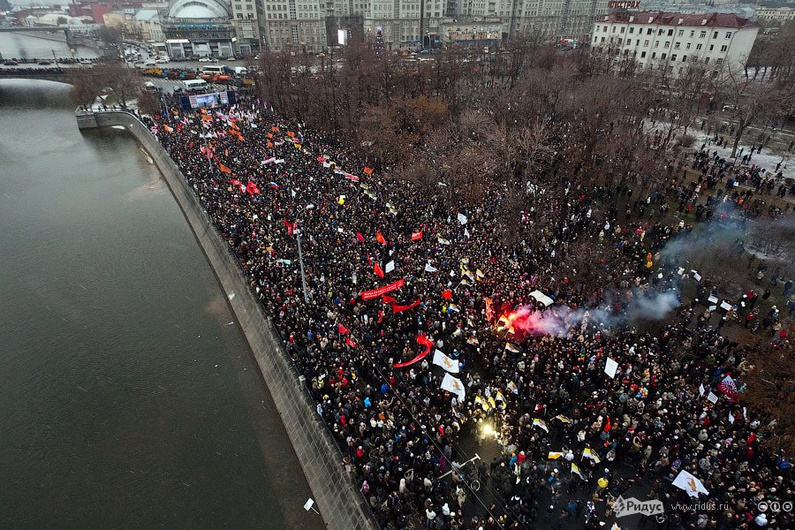 I was sitting in a café with a Russian friend in Moscow on 5 December 2011, the day after the brazenly fraudulent state Duma elections. We discussed how some regions had reported impossible results of 99.5% support for Putin’s United Russia party. We joked about how pro-government voters had been bussed from polling station to polling station, voting for United Russia over and over again throughout the day, cheerful little carousels of fraud. It wasn’t funny, but the only thing you could do was laugh for we knew nothing would change.
I was sitting in a café with a Russian friend in Moscow on 5 December 2011, the day after the brazenly fraudulent state Duma elections. We discussed how some regions had reported impossible results of 99.5% support for Putin’s United Russia party. We joked about how pro-government voters had been bussed from polling station to polling station, voting for United Russia over and over again throughout the day, cheerful little carousels of fraud. It wasn’t funny, but the only thing you could do was laugh for we knew nothing would change.
But this time was different
My friend suddenly lost interest in me and stared at her phone in disbelief before beginning to text furiously. This cycle was repeated, her disbelief and her tapping intensifying each time. Finally she looked up, her face contorted in a curious cocktail of disbelief, fear and excitement. “They're protesting!” she shouted, “Thousands of people are protesting at Chistye Prudy! My sister's friend was just arrested!”
Winter snow was falling outside. Putin's party had just 'won' another resounding victory. It should have been business as usual in Russia, but for once civil society was not about to hibernate. This time was different.
Five days later on Saturday 10 December, Bolotnaya Square hosted the biggest street protest Russia had seen in 20 years since the collapse of the Soviet Union. 50, 000 people gathered in the snow. Russia was awakening. It felt like something was happening. “Bolotnaya” became synonymous with freedom and change. “Bolotnaya” was a magic word.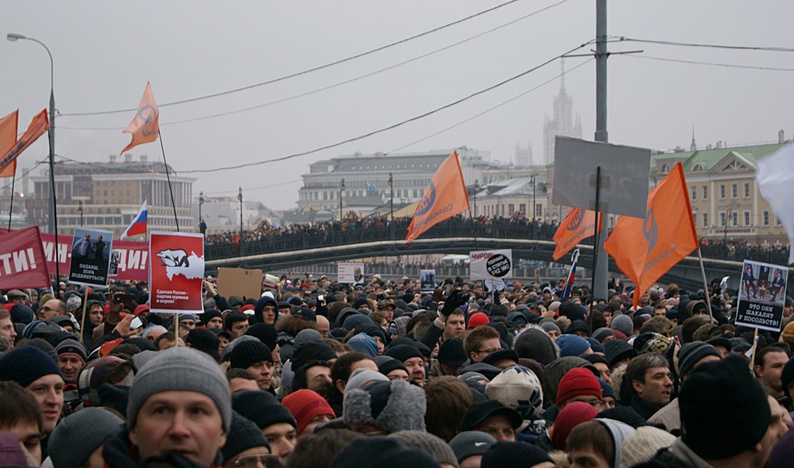
Fast forward two years and things are different. Instead of a totem of resistance and mass solidarity, “Bolotnaya” has become synonymous with a cruel, scripted trial. By making an example of these young, non-radical protestors, students with hopes and dreams for the future, the government sought to reappropriate the symbolism of Bolotnaya Square. The authorities have poisoned that magic word.
But the government has gone further than just neutralising symbols. During his third term, Putin has ravaged Russia’s incipient civil society with a blitz of legislation. Fines for participants of ‘unsanctioned’ protests have increased 150-fold to £6000. The legal definition of treason has been expanded to include almost anyone who deals with foreigners. In November 2012 he clobbered NGOs with the ‘foreign agents law’.
As the “Bolotnaya Eight” were sentenced on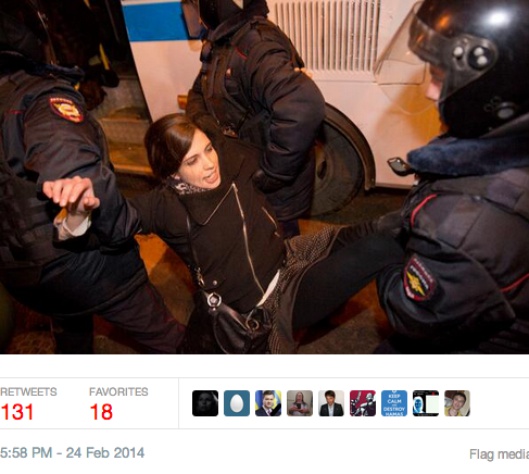 Monday, protestors outside the courtroom chanted “Maidan! Maidan!” invoking the astonishing achievement of Ukrainian protestors who had deposed their President over the weekend. But as the police rounded up 200 protestors and bundled them into vans, there was a sense that the Ukrainian revolution would render change all the more unattainable for the Russian opposition. A scared autocrat is a cruel autocrat and there was no doubt Putin was quaking.
Monday, protestors outside the courtroom chanted “Maidan! Maidan!” invoking the astonishing achievement of Ukrainian protestors who had deposed their President over the weekend. But as the police rounded up 200 protestors and bundled them into vans, there was a sense that the Ukrainian revolution would render change all the more unattainable for the Russian opposition. A scared autocrat is a cruel autocrat and there was no doubt Putin was quaking.
Fear is Putin’s driving force
I spoke to Alexis Prokopiev, the President of Russie Libertés, a Paris-based civil rights organisation that focuses on democracy in Russia. He tells me that fear has been Putin’s primary driving force during his third presidential term. On the eve of his third inaugauration, “Putin didn’t expect 200, 000 people to take to the streets,” says Prokopiev, “He was afraid, and that’s why he pursued all these laws against liberty.”
Prokopiev says this fear was intensified exponentially by events in Ukraine, “Putin knows that his regime is just as corrupt and authoritarian and he is afraid that he’ll end up like Yanukovych. The heavy punishments [for the Bolotnaya Eight] are Putin’s way of sending a message to anybody thinking about taking part in protests.”
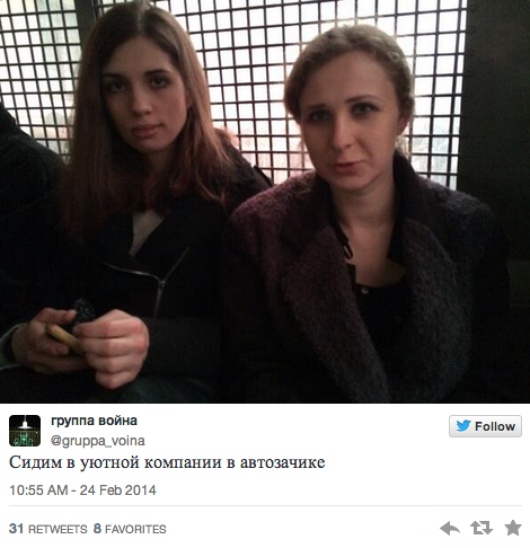 Doesn’t all this paint a bleak picture of Russia’s future? Prokopiev does not think so. “In reality, protestors and civil society in Russia have become so used to this type of oppression, it doesn’t discourage them from taking civil actions,” he says, “He can’t suppress Russian civil society because civil society has woken up.” Indeed the enduring image from Monday 24 February is not the Bolotnaya Eight being led away in chains and packed off to penal colonies in Siberia. Neither is it the arrest of 200 people outside the court room, amongst them Alexei Navalny and Pussy Riot Members Nadezhda Tolokonnikova and Maria Alyokhina.
Doesn’t all this paint a bleak picture of Russia’s future? Prokopiev does not think so. “In reality, protestors and civil society in Russia have become so used to this type of oppression, it doesn’t discourage them from taking civil actions,” he says, “He can’t suppress Russian civil society because civil society has woken up.” Indeed the enduring image from Monday 24 February is not the Bolotnaya Eight being led away in chains and packed off to penal colonies in Siberia. Neither is it the arrest of 200 people outside the court room, amongst them Alexei Navalny and Pussy Riot Members Nadezhda Tolokonnikova and Maria Alyokhina.
No, Monday will be remembered for the day's second demonstration, which was led by people who were arrested earlier, released in the evening and immediately returned to the streets to protest. Russian civil society is like a balloon- when Putin squeezes one part it bulges out elsewhere. Every Putin repression seems to enhance Russians’ resilience, every blow increases their courage and bravado. It seems Putin’s fear is not only well-founded - his paranoia is a self-fulfilling prophesy.



